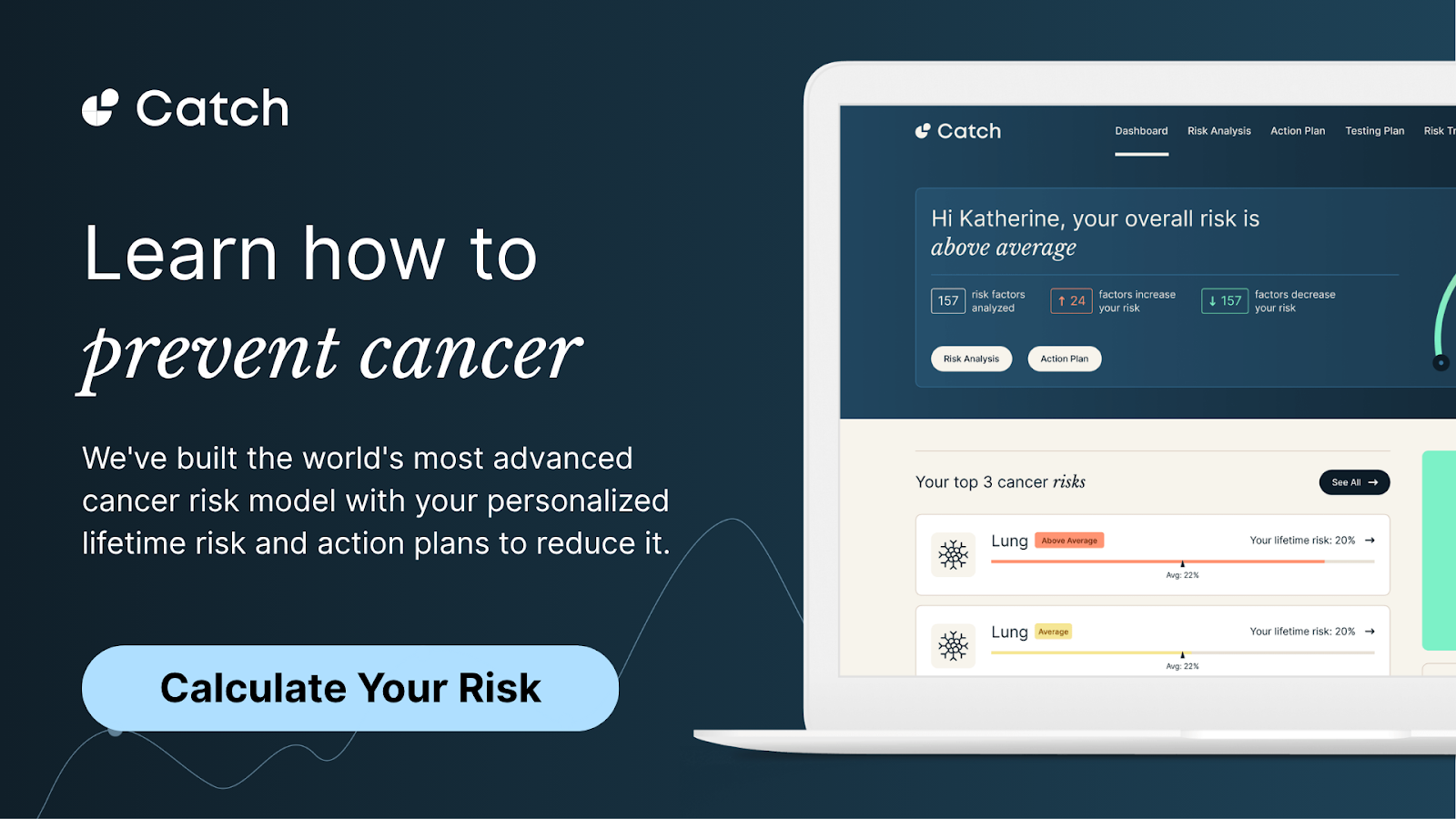Key Takeaways:
- Mouthwash may affect risk of cancer: Some studies suggest a potential link between alcohol-based mouthwash and oral cancer, particularly in high-risk groups like smokers or heavy drinkers, but the evidence is not conclusive.
- Different types of mouthwash: Alcohol-free mouthwashes are a safer alternative for those concerned about cancer risk, though all mouthwashes contain various chemicals whose long-term effects are still being studied.
- Maintain good oral hygiene for cancer prevention: Regardless of mouthwash use, get regular dental checkups and maintain a healthy lifestyle to aid cancer prevention and early detection.
Every detail is significant for those looking to make informed health decisions, particularly regarding cancer. You might have encountered alarming reports about alcohol-based mouthwashes increasing oral cancer risk, or maybe it's just a topic that naturally piqued your interest. You’ve come to the right place.
At Catch, we understand the need for clear answers. Discerning whether mouthwash does or doesn’t cause mouth cancer calls for the analysis of studies and headlines. But this may lead to more confusion than clarity.
In this article, we’ll examine science-backed information, sifting through extensive clinical research to offer you peace of mind. We’ll get to the heart of the matter and examine whether your mouthwash does or doesn’t cause mouth cancer.

The Debate On Mouthwash And Cancer
Amidst the regular grooming products in our bathrooms, alcohol-based mouthwash has come under the microscope for its suspected connection to cancer. The core of the concern hinges on the ethanol in these mouthwashes, commonly between 10% and 25%, a recognized carcinogen that becomes acetaldehyde during metabolism, posing a threat to our DNA.
Back in 2008, an Australian Dental Journal study hinted at the possibility that everyday use could up the ante for oral cancer risk, with acetaldehyde's persistence in the mouth possibly leading to tissue irritation and cellular changes over time. Even now, the research is largely inconclusive. A recent comprehensive systematic review and meta-analysis suggests that researchers should look at factors like frequency, duration, and substance of mouthwashes to gain more conclusive evidence.
Current Recommendations On Mouthwash Use
The American Dental Association (ADA) states that there are mouth rinses that can help you combat oral health challenges like bad breath, gingivitis, and tooth decay. However, children under age six should not use it unless directed by a dental professional. Nevertheless, there is no harm in choosing an alcohol-free mouthwash if you are concerned about its influence on oral cancer risk. It's smart to keep up with the latest research, since scientific understanding and health guidelines can change.
Remember that cancer risks are multifaceted. Healthy habits like quitting smoking, maintaining oral health, and eating well have a far greater impact on your overall risk than your choice of mouthwash. Those with certain risk factors, such as tobacco use and heavy alcohol consumption, should be particularly mindful. Focusing on a well-rounded approach to health and well-being is ideal.

The Importance Of Oral Hygiene In Cancer Prevention
Maintaining good oral hygiene is critical not only for a healthy smile but also for your overall well-being. Research continually underscores the potential link between oral health and the risk of developing certain types of cancer. A consistent oral hygiene routine (brushing, flossing, and regular dental check-ups) may play a significant role in preventing cancer, particularly in preventing oral and oropharyngeal cancers. As a refresher, check out our blog on how to prevent cancer.
The mechanics behind this connection are straightforward. Poor oral health, such as chronic gum disease, can lead to persistent inflammation, providing the ideal environment for the initiation of cancerous cells. In fact, gum disease significantly increases the risk of cancers such as stomach and esophageal cancer.
The key takeaway is that oral health is a critical component of our overall health strategy, and its role in preventing cancer is an area of active research and discussion. By maintaining good oral hygiene, you can actively participate in your health management, potentially lowering the risk of certain cancers.
How Lifestyle Choices Affect Oral Health
Lifestyle plays a substantial role in cancer prevention. Lifestyle choices such as the following can act as risk factors for oral cancer or protective factors, if you follow recommendations like avoiding smoking and drinking.
- Tobacco: Tobacco use isn’t just a lung cancer risk factor. Studies show smokers are up more likely to develop oral cancers, with the risk compounding over years of exposure. Chewing tobacco is even worse; it is associated with cancers of the gums, cheek, and inner lip, as well as tooth loss and other oral health problems.
- Alcohol: Research from the National Cancer Institute links excessive alcohol consumption to a heightened chance of oral cavity cancers. Alcohol dehydrates tissues, irritates linings, and creates a fertile ground for carcinogens to take root.
- Nutrition: Sugary drinks can mess with the pH balance in your mouth, fostering bacteria that can inflame gums and contribute to conditions ripe for cancer development. Conversely, the ideal cancer prevention diet is rich in fruits, vegetables, and antioxidants, which can act like a shield, neutralizing free radicals and supporting tissue repair.
- Stress Management: Chronic stress can drive behaviors (grinding teeth, neglecting hygiene) that wear down oral defenses. Stress hormones like cortisol can also affect your immune response, leaving your mouth less equipped to fight off early abnormalities.
These factors, paired with oral hygiene, vigilance, and awareness, are all good things to focus on if you’re concerned with oral cancer risk.
Symptoms Of Oral Cancer
Early detection can increase the survival rate of oral cancer dramatically, so knowing what to look out for matters. Potential signs and symptoms of oral cavity and oropharyngeal cancer include but aren’t limited to:
- Non-healing sores in the mouth.
- Lumps or thickening in the cheek, gums, or tongue.
- Persistent pain or numbness in the mouth or lips.
- Difficulty chewing, swallowing, or speaking.
- White or red patches on gums, tongue, inside of cheeks.
- Hoarseness or chronic sore throat.
Routine dental checkups are critical for spotting early signs of cancer. If abnormalities are noted, dentists may refer patients for biopsies or imaging tests.
Take Control Of Your Cancer Risk With Catch
The uncertainty around something as everyday as mouthwash potentially raising your cancer risk is exactly why you need to stop guessing and start knowing. At Catch, we’re here to arm you with hard data and personalized insights drawn from over 10,000 clinical studies. Here’s why you should join us today:
- Unmatched Precision: Our assessment analyzes over 500 validated risk factors to give you a detailed picture of your cancer risk.
- Personalized Action Plans: Get tailored screening and lifestyle recommendations that adapt as your risk evolves.
- Science-Backed Confidence: Rely on data from the world’s largest cancer datasets, not internet rumors.
- Social Impact: For every paid membership, we donate a free one to someone in need, ensuring access for all.
Don’t let unanswered questions about your health linger. Sign up for Catch and take the first step toward proactive cancer prevention.

Final Thoughts
When it comes to the question, "Does Mouthwash Cause Cancer?"The evidence remains murky. As we’ve explored, some research hints at a potential link between alcohol-based mouthwashes and oral cancer, while other data finds no conclusive tie. On the other hand, more substantial and confirmed risk factors, like tobacco use, are critical for cancer prevention.
At Catch, we aim to empower you with personalized, science-backed insights into your cancer risk. If you’re worried about mouthwash or other lifestyle factors, our comprehensive assessment, covering the 21 most common cancers, can help you understand your unique risk profile and take proactive steps. From tailored screening plans to actionable lifestyle changes, we’re here to guide you with precision.
Cancer prevention isn’t about fear; it’s about knowledge. Whether questioning everyday products like mouthwash or diving deeper into family history, Catch equips you to act confidently. And through our sponsored membership program, we’re ensuring everyone gets access to this life-changing clarity regardless of circumstance. Let’s face the uncertainty together, armed with evidence.
Read also:
Frequently Asked Questions About Mouthwash And Cancer Risk
How frequently is it safe to use mouthwash?
Most dental professionals suggest using mouthwash once or twice daily as part of a broader oral hygiene routine. However, overdoing it, especially with alcohol-based products, can irritate oral tissues and potentially elevate risks over time. Getting personalized advice from your dentist is the best way to go.
Can mouthwash cause other health problems besides cancer?
Beyond cancer concerns, mouthwash (particularly those with high alcohol content) can contribute to issues like dry mouth, which disrupts saliva production and may increase the risk of cavities and gum disease. Some studies also point to potential links with altered oral microbiomes, which could have broader health implications.
Has the FDA issued any warnings about mouthwash and cancer?
Currently, the FDA hasn’t issued specific warnings linking mouthwash to cancer. They regulate mouthwash as a cosmetic or over-the-counter drug depending on claims (like fighting gingivitis), but no direct cancer-related advisories exist. That said, the research is ongoing. Catch stays ahead of the curve, integrating the latest data into our assessments to keep users informed.
What does the American Dental Association say about mouthwash and cancer?
The American Dental Association (ADA) has not endorsed a direct link between mouthwash and cancer. They emphasize that mouthwash can be a useful adjunct to brushing and flossing for controlling plaque and gingivitis, particularly when ADA-accepted products are used. However, they don’t dismiss the need for more research on long-term effects.
Does Listerine cause cancer?
Right now, there’s no solid evidence to support mouthwashes like Listerine as a direct cause of cancer. Further research should provide more insight into the connection between mouthwash and cancer.
Are some people at a higher risk of oral cancer than others?
Oral cancer risk isn’t uniform. Individuals with a family history of oral cancer, smokers, heavy drinkers, or those with some pre-existing oral conditions are more vulnerable. If you are at an increased risk of oral cancer, it is imperative to be vigilant.
Do dentists recommend using mouthwash despite cancer risks?
Many dentists still recommend mouthwash as a tool for oral health, particularly for managing plaque or bad breath, but they often stress the importance of moderation and context. For patients with specific risk factors, they might suggest alcohol-free alternatives or skipping it altogether if brushing and flossing suffice.
Sources:
- Australian Dental Journal. (2008, November 27). The role of alcohol in oral carcinogenesis with particular reference. http://onlinelibrary.wiley.com/doi/10.1111/j.1834-7819.2008.00070.x/full
- American Dental Association. (n.d.). Mouthrinse (Mouthwash). https://www.ada.org/resources/ada-library/oral-health-topics/mouthrinse-mouthwash
- Harvard Health. (2020, October 1). Gum disease linked to an increased risk for cancer. https://www.health.harvard.edu/cancer/gum-disease-linked-to-an-increased-risk-for-cancer
- American Cancer Association. (n.d.). Risk Factors for Oral Cavity and Oropharyngeal Cancers. https://www.cancer.org/cancer/types/oral-cavity-and-oropharyngeal-cancer/causes-risks-prevention/risk-factors.html
- American Cancer Association. (n.d.). Signs and Symptoms of Oral Cavity and Oropharyngeal Cancer. https://www.cancer.org/cancer/types/oral-cavity-and-oropharyngeal-cancer/detection-diagnosis-staging/signs-symptoms.html










.svg)



